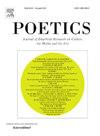What is the role of creative industries in the Anthropocene? An argument for planetary cultural policy
IF 1.7
2区 社会学
0 LITERATURE
引用次数: 0
Abstract
Many artistic expressions call for cultural, social and political change. Though the policy environments in which they emerge remain predominantly wedded to a consumption-driven creative economy. In doing so, they tacitly endorse a methodologically nationalist perspective on artistic expression, trade in creative goods and services, and cultural identity. By using the United Nations resolution on the International Year of Creative Economy for Sustainable Development 2021 as a case in point, we argue that the language of this document, which reflects the current hegemonic discourse of creative economy, misses its target when claiming to promote sustainability because it is (1) anthropocentric, (2) growth-focused and (3) methodologically nationalist. Through a discourse analysis of this particular UN resolution, we demonstrate the multiple and conflicting connections between culture and sustainability through the perspective of planetary well-being. The main target of our criticism is the anthropocentric nature of sustainability discourses, but also their unreserved promotion of perpetual economic growth. In response, we articulate the need for a profound cultural shift from anthropocentric worldviews, growth-oriented ideologies, and methodologically nationalist frameworks to enable environmentally engaged cultural policies and citizens.
创意产业在人类世的角色是什么?全球文化政策的论据
许多艺术表现要求文化、社会和政治变革。尽管他们所处的政策环境仍然主要与消费驱动的创意经济相结合。在这样做的过程中,他们默认了一种方法上的民族主义观点,即艺术表达、创意商品和服务的贸易以及文化认同。以联合国关于2021年创意经济促进可持续发展国际年的决议为例,我们认为,该文件的语言反映了当前创意经济的霸权话语,在声称促进可持续性时没有达到目标,因为它是(1)以人类为中心,(2)以增长为中心,(3)方法论上的民族主义。通过对这一特定的联合国决议的话语分析,我们从地球福祉的角度展示了文化与可持续性之间多重且相互冲突的联系。我们批评的主要目标是可持续性话语的人类中心主义本质,以及它们毫无保留地促进永久经济增长。作为回应,我们阐明了从以人类为中心的世界观、以增长为导向的意识形态和方法论上的民族主义框架中进行深刻的文化转变的必要性,以实现环境参与的文化政策和公民。
本文章由计算机程序翻译,如有差异,请以英文原文为准。
求助全文
约1分钟内获得全文
求助全文
来源期刊

Poetics
Multiple-
CiteScore
4.00
自引率
16.00%
发文量
77
期刊介绍:
Poetics is an interdisciplinary journal of theoretical and empirical research on culture, the media and the arts. Particularly welcome are papers that make an original contribution to the major disciplines - sociology, psychology, media and communication studies, and economics - within which promising lines of research on culture, media and the arts have been developed.
 求助内容:
求助内容: 应助结果提醒方式:
应助结果提醒方式:


